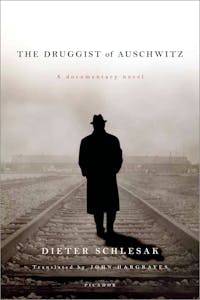The Druggist of Auschwitz
A Documentary Novel
 Download image
Download image
ISBN10: 1250002370
ISBN13: 9781250002372
Trade Paperback
384 Pages
$23.00
CA$25.00
Adam, known as "the last Jew of Schäßburg," recounts with disturbing clarity his imprisonment at the infamous Auschwitz concentration camp. Through Adam's fictional narrative and through excerpts of actual testimony from the Frankfurt Auschwitz Trial of 1963–65, the factual story of Dr. Victor Capesius, a man who, despite strong friendships with Jews before the war, quickly aided in and profited from their tragedy once the Nazis came to power, emerges. Interspersed with historical research and the author's face-to-face interviews with survivors, the novel follows Capesius from his assignment as the "sorter" of new arrivals at Auschwitz—deciding who will go directly to the gas chamber and who will be used for labor—through his life of lavish wealth after the war, to his arrest and eventual trial.
Reviews
Praise for The Druggist of Auschwitz
"Like the novels of W.G. Sebald . . . [The Druggist of Auschwitz] will fill you with despair and rage and terrible shame at the infinite ingenuity of human cruelty. By steeling himself not to flinch before the hideous reality of the Holocaust, Schlesak has created a beautiful book."—David Laskin, The Seattle Times
"That Dieter Schlesak could write this novel in what Adam calls the executioner's language serves as some small triumph. That he could look at all of this with a clear eye and help the reader to do the same is a major triumph."—Alan Cheuse, NPR
"A great book that hits you like a fist . . . An unforgettable tapestry of evil . . . [The Druggist of Auschwitz] shows that, as Melville said, the truth is more unthinkable than fiction."—Claudio Magris, Corriere della Sera (Italy)
"Retracing the story of Dr. Capesius, in which appear other infamous figures—such as Josef Mengele, the ‘Angel of Death'; Fritz Klein, the ‘Assassin for Good'; and the camp commandant, Rudolf Höß—Schlesak reconstructs the terrifying history of Auschwitz: the trauma of arrival, the torture of the prisoners, the horror of the gassings and cremations. Schlesak writes with a dry style, almost with the distance of a reporter, giving us a powerful testimony on the banality of evil. The Druggist of Auschwitz is a book which confirms that sometimes the truth is more unimaginable than the most horrible fantasy."—Gaetano Vallini, L'Osservatore Romano (Vatican City)
"Dieter Schlesak not only has created a shattering work of great literary power and authenticity . . . but also sheds light on the relationship between perpetrators and their victims."—Claus Stephani, David: Jüdische Kulturzeitschrift (Austria)
"Written in a fluid style with little intervening commentary . . . The Druggist of Auschwitz is nothing less than a minimally guided tour of hell on earth."—Booklist
"Schlesak, in his first book in English translation, is interested in documentation, here achieved through a collage of facts and firsthand narratives of the Holocaust by victims and perpetrators alike. Centering the narrative around the 1964 Auschwitz trial in Frankfurt of Victor Capesius, the director of the Auschwitz medical dispensary, who methodically enriched himself with assets stolen from those arriving on the Hungarian transports, Schlesak contrasts the suffering of the camp survivors with the apparently conscience-free lives of those who were 'obeying orders.' He interviews Roland Albert, an Auschwitz guard and his mother's favorite cousin, who Schlesak knew as a young boy in Germany, and who seems to feel no real sense of responsibility for the Holocaust. To understand the survivors, Schlesak, as author-narrator, talks with Adam Salmen, the so-called "last Jew of Schässburg," whose camp diary is excerpted to heartrending effect as are his struggles with survivor guilt: 'And even if you have gotten out, you never really escape . . . ' The way testimony is collected and presented, without real narrative intervention, lends immediacy and veracity, but also feels less novelistic. Schlesak's work is relentless, sometimes too painful to read, testament to the fact that, in describing Auschwitz, no literary consolation is possible."—Publishers Weekly
Reviews from Goodreads
BOOK EXCERPTS
Read an Excerpt
THE EYEWITNESS
1
They are herding us toward the showers. I see a long trench blazing with flames, I hear screams, children crying, dogs barking, gunshots. I see leaping shadows, half hidden behind the high flames....


